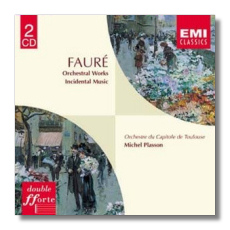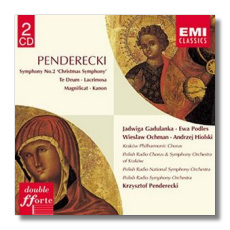
The Internet's Premier Classical Music Source
Related Links
- Latest Reviews
- More Reviews
-
By Composer
-
Collections
DVD & Blu-ray
Books
Concert Reviews
Articles/Interviews
Software
Audio
Search Amazon
Recommended Links
Site News
 CD Review
CD Review
EMI "double fforte" Reissues

Gabriel Fauré
- Pelléas et Mélisande
- Masques et Bergamasques
- Shylock
- Caligula
- Les Djinns
- Pénélope: Prélude
- Ballade for Piano and Orchestra
- Élégie for Cello and Orchestra
- Berceuse for Violin and Orchestra
- Fantaisie for Piano and Orchestra
Frederica von Stade, mezzo-soprano
Nicolai Gedda, tenor
Jean-Philippe Collard, piano
Paul Tortelier, cello
Yan-Pascal Tortelier, violin
Ensemble Vocal Alix Bourbon
Orchestre du Capitole de Toulouse/Michel Plasson
EMI Classics 74840 2 DDD 2CDs 67:00, 70:42


Krzysztof Penderecki
- Symphony #2 "Christmas Symphony"
- Te Deum
- Lacrimosa
- Magnificat
- Kanon
Jadwiga Gadulanka, soprano
Ewa Podleś, mezzo-soprano
Wiesław Ochman, tenor
Andrzej Hiolski, baritone
Peter Lagger, bass
Polish Radio Chorus of Kraków
Soloists and Boys' Chorus from the Kraków Philharmonic Chorus
Polish Radio Symphony of Kraków/Krzysztof Penderecki
Polish Radio National Symphony Orchestra/Krzysztof Penderecki
Polish Radio Symphony Orchestra/Krzysztof Penderecki
EMI Classics 74852 ADD 2CDs: 73:23, 60:18
These are two new releases in EMI Classics' "double fforte" series – two discs for the price of one. If you don't insist on the most current recordings, this series is a godsend, and it has been around for long enough that the material released in it now is often quite far off the beaten path.
Once you have become acquainted with Fauré's eternally restful Requiem, where else can you go? The double fforte release devoted to his orchestral and incidental music answers that question perfectly. Lacking only a representation of his chamber music, piano music, and songs, it's almost an "instant Fauré" collection of sorts. Although not all of the music is familiar, almost all of it is top-quality Fauré. This is a composer who seemed to be at his best when he was looking inward, and even his incidental music for Caligula (the play by Alexandre Dumas père, not the film starring Malcolm McDowell!) celebrates the beauty of the internal, not pageant or excess.
While Michel Plasson rarely emphasizes showmanship in the manner of Charles Munch, Charles Dutoit, and Paul Paray (to name just three specialists in the French repertoire), he is never less than dependable. His tasteful interpretations never force the music into being something that it is not, and his temperament is well matched to that of the retiring and modest composer. Frankly, his orchestra is more disciplined and tonally smooth than those found in the French capital. Throughout these two discs, he is joined by one admirable soloist after another. Frederica von Stade is luminous in Mélisande's song (sung in English, as Fauré wrote this incidental music for an English production of Maeterlinck's French play), and Nicolai Gedda makes light of his many years in his various solos from Masques et Bergamasques and Shylock (a "comedy" that is "loosely based" on Shakespeare's The Merchant of Venice). Pianist Collard excels both in the neo-Chopin traceries of the Ballade, and in the Fantaisie's tougher stuff, and the Torteliers – father and son – bring their similarly refined styles to the Élégie and Berceuse, respectively.
These recordings were made in 1979 and 1980 and boast essentially modern sound, although I am not entirely pleased with the shallowness of the piano's tone in the Ballade and the Fantaisie – an early digital artifact?
The pair of Penderecki discs takes the Polish composer down the evolutionary scale, as the first works on the program are the most recent and the last work is the oldest. The composer's style changed dramatically in the 1970s and 80s, and probably there's no more compelling Exhibit A than what EMI Classics offers here.
The Second Symphony (1980) is hardly a celebratory work, its subtitle notwithstanding. "Christmas Symphony" alludes to the rather baffling interpolation of "Silent Night" in the work's material. This 35-minute symphony in one movement could hardly be more serious, and it finds the composer embracing tonality and convention in a manner that would have been unthinkable to him twenty years earlier. As far as reactionary music goes, it gives the listener a run for his or her money, although there's little trace of Penderecki the sonic innovator here. The Te Deum (also 1980) was inspired, in part, by Karel Wojtyła's accession to the papacy. In contrast to other settings of the Te Deum, Penderecki eschews celebration for intense earnestness. What makes this work worth hearing, even though it too is quite conventional, is the choral writing, of which the composer remains a master, regardless of what style he writes in. The brief Lacrimosa is the third piece from 1980. (It was the Te Deum's discmate on the original LP release.) This is a genuine masterpiece, and a moving juxtaposition of an ancient sacred text with a contemporary situation: Penderecki wrote the Lacrimosa for the tenth anniversary of the Gdansk uprising.
The Magnificat (1974), although it is a transitional work, is a very fine one. Here, Penderecki is shedding his avant-garde skin and starting to embrace tonality. The tension between styles makes the music gripping. One might argue that Penderecki's intense and sometimes frightening writing is inappropriate for the Latin text. (Swooping choral glissandos and skittery string effects evoke images of flying saucers, not angels, glorifying the Virgin Mary.)
The Kanon (1962) brings these CDs to a close with a bang. When EMI Classics released its previous Penderecki compilation (double fforte 5 74302-2), I bemoaned the Kanon's absence, and I am happy to see it resurface here, although it is almost ridiculous to juxtapose it with the other works. This is Penderecki at his most experimental, and an impressive array of sounds is created through unusual playing techniques. Here, the composer also introduces a tape recorder, which records the performance in progress; later in the work, the orchestra plays to the accompaniment of this tape. At least one horror movie has used the explosive Kanon in its soundtrack, and I think it's safe to say that it will stop most listeners dead in their tracks.
The composer is a fine conductor, and I have no reason to believe that these recordings are not definitive. The engineering is serviceable or better – the Magnificat sounds a little woolly, a fault that was present on the LPs.
EMI continues to state that the "sung texts and translations," not included in the booklet notes, "are on the EMI Classics website." This would be a good space- and cost-saving strategy – if only it were true! Unfortunately, it isn't. Isn't it about time that the label got on the stick and either uploaded the goods or took that false claim out of their releases?
Copyright © 2002, Raymond Tuttle


















